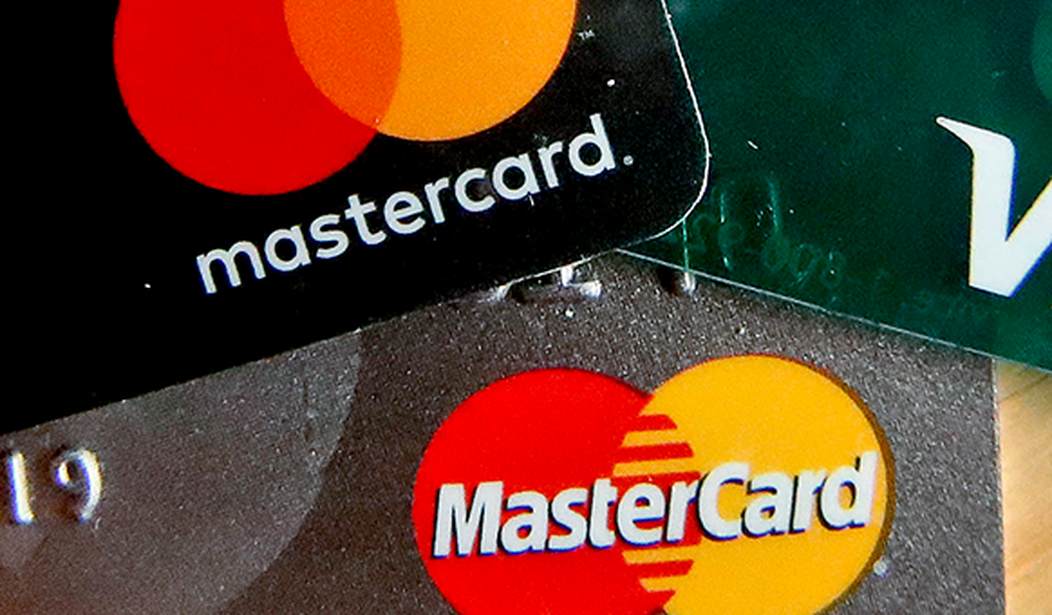For the most part, financial services companies erect employee bonus systems for one reason and one reason only: to maximize shareholder profits.
However, a strange new occurrence is afoot in the financial services sector, wherein companies are no longer concerned with maximizing shareholder value—which is their fiduciary responsibility and reason for being—because they are more interested in lining their own pockets by aligning themselves with the latest woke investment scheme known as environmental, social, and governance (ESG) scores.
Take Mastercard for example, which recently announced it will begin “linking employee compensation to ESG goals.”
According to Mastercard CEO Michael Miebach, “Last year, we introduced a new compensation model for our executives at the executive vice president level and above. Their bonus was determined in part by the company’s performance on three Environmental, Social and Corporate Governance priorities: carbon neutrality, financial inclusion and gender pay parity.”
Miebach continued, “Each and every one of us shares the responsibility to uphold our ESG commitments. That’s why we’re extending that model to our annual corporate score and all employees globally, taking our shared accountability and progress to the next level. The corporate score rewards employees for going above and beyond to deliver strong results for the company. Beginning this year, achieving our ESG goals will now factor into bonus calculations for all employees.”
So, from now on, all employees at Mastercard are likely to put ESG investing as priority number one, seeing as how they will be rewarded with hefty bonuses for doing so.
As Miebach explains, this means, “Our ESG priority areas remain the same, with a sharpened focus on the environment, including reducing emissions and partnering with suppliers committed to decarbonization. While our global efforts go much broader and deeper, we’re tying compensation to emissions, financial inclusion and the gender pay gap because we have a substantial impact in these areas and because they closely align with our vision. Making personal, financial and environmental success attainable for everyone – that’s how we power economies and empower people.”
Recommended
Although ESG investing is a relatively new idea with a questionable track record of success, it has become all the rage among big banks and big government.
In a nutshell, ESG scores and ESG investing seeks to upend “shareholder capitalism” with what is commonly called “stakeholder capitalism.” Instead of putting a company’s financial metrics first and foremost when determining its risk profile, ESG scores shun traditional metrics in favor of social objectives, such as a company’s carbon footprint, size of its facilities, and racial/gender diversity of its board.
In other words, ESG investing is less concerned with the financial prospects of a given company because its number one priority is ensuring woke ideology wins the day.
This is a bad deal for the vast majority of investors, who could not care less about a company’s carbon footprint or their racial/gender ratios on the board. For most investors, their number one concern when investing in a company is rather simple: Will it make money over the long term?
On the other hand, ESG is a great deal for big banks and financial services firms like Mastercard.
As my colleague Justin Haskins notes, “There is nothing ‘free market’ about ESG systems, nor other similarly subjective ratings systems. The ESG model is effectively collusion. It’s closer to the way mafias operate than it is to a market-based economy. Instead of responding to the desires of customers, businesses are forced to listen to the demands of a small group of banks, investors, and international institutions. Under an ESG scheme, big banks, Wall Street firms, and financial institutions work together with activists to decide as a group which markets and businesses they will allow to survive and which ones will be destroyed. And those decisions are not based on free-market considerations.”
Put another way, ESG scores empower the big banks and giant financial institutions to game the system even more than they already do by allowing them to funnel enormous sums of money straight into the coffers of companies that happen to fall in line with their woke agenda.
After the 2008 financial crisis, when they faced scrutiny for their role in the housing bubble, big banks and Wall Street investment firms realized they had to toe the woke line, or else they would face the ire of government regulators and woke activists. It seems that by adopting ESG scores, the big banks and their ilk are trying to pull another fast one over we the people, while making out like bandits in the process.
As the old saying goes, fool me once, shame on you; fool me twice, shame on me.
Chris Talgo (ctalgo@heartland.org)is senior editor at The Heartland Institute.

























Join the conversation as a VIP Member